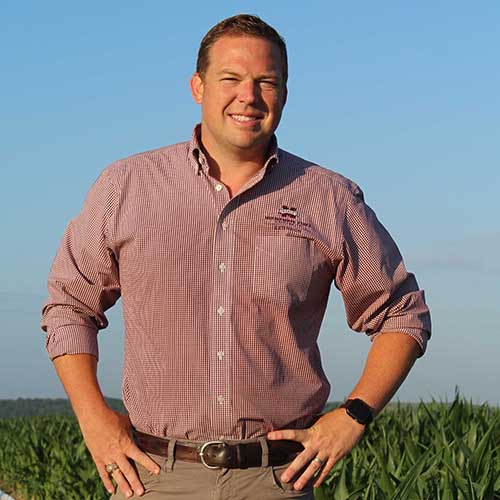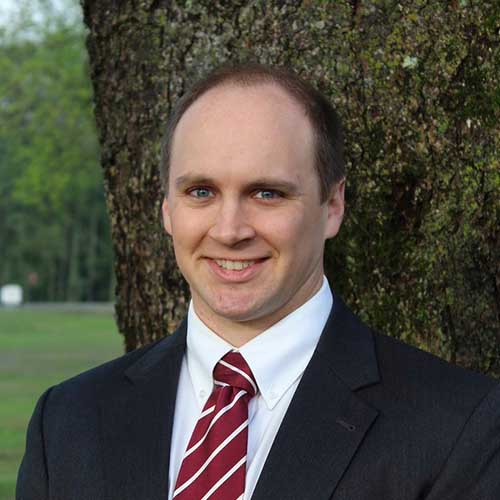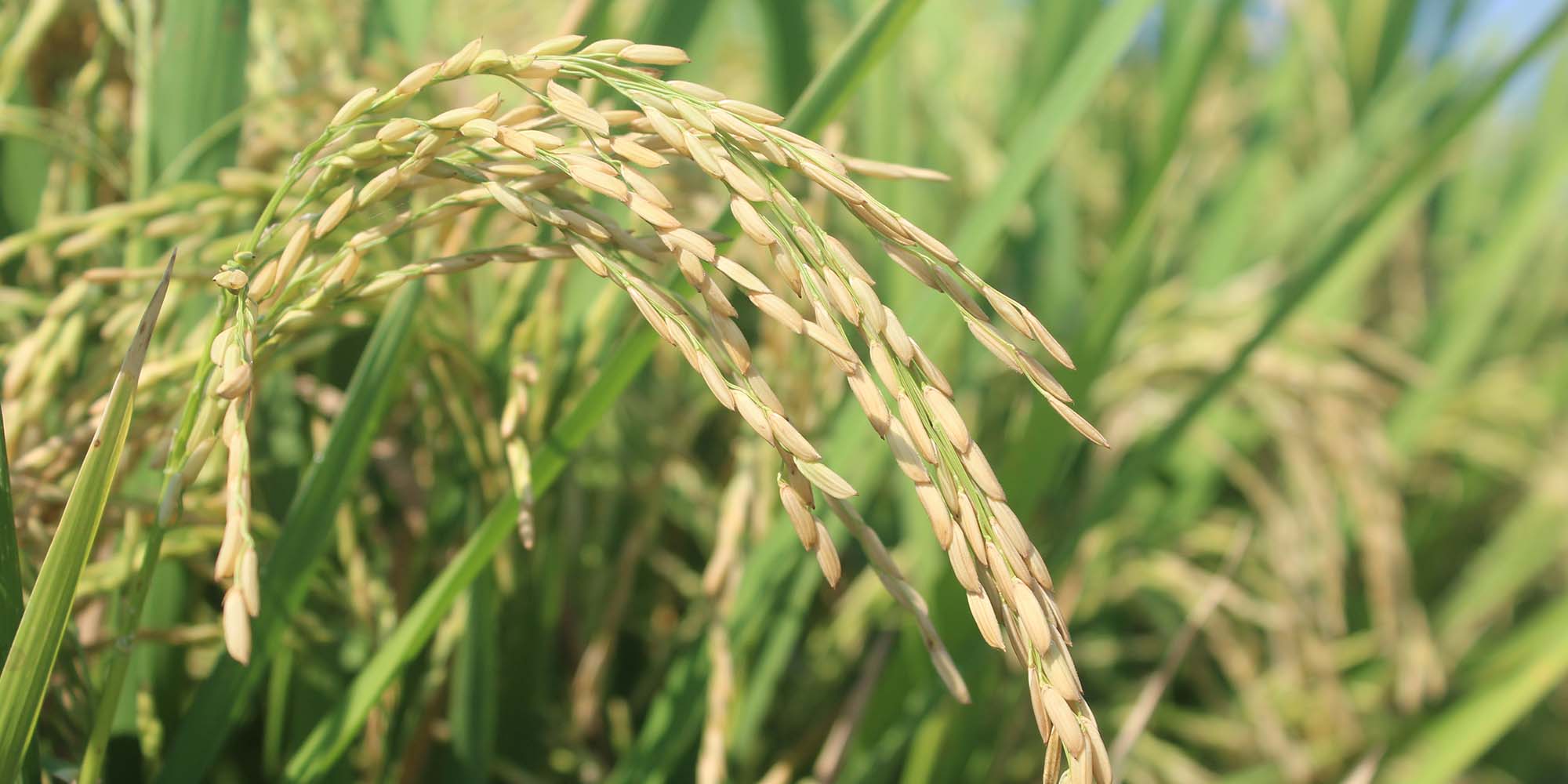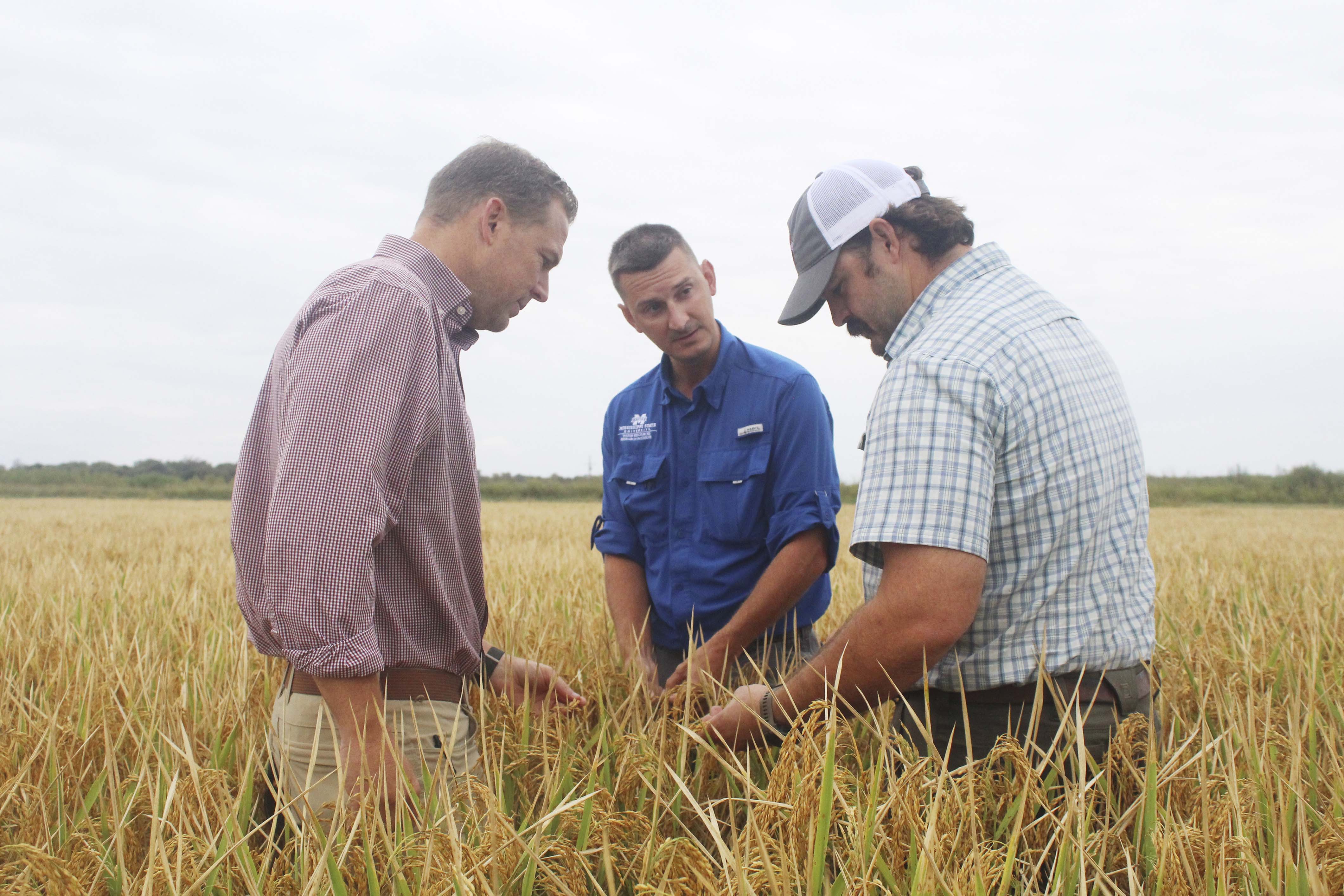The information presented on this page may be dated. It may refer to situations which have changed or people who are no longer affiliated with the university. It is archived as part of Mississippi State University's history.
While rice is fundamental to global food security, it takes about 300 gallons of water to produce one pound of the global staple. In 2023, Mississippi harvested 118,000 acres of rice, generating $135 million in production value, making it the nation's sixth-largest rice producer. The overuse of the Mississippi River Valley Alluvial Aquifer has caused a decline in ground water. As pumping costs soar, and wells run dry, a belief takes root: sustainable irrigated agriculture may be unattainable in the Lower Mississippi River Basin. That's why it's paramount that Mississippi Agricultural and Forestry Experiment Station, or MAFES, researchers come together to find innovative solutions to improve water conservation in this region.
Drew Gholson, assistant professor in plant and soil sciences, shares how they will tackle this growing issue.
"Conventionally, rice is a crop that grows in water, where a constant flood is maintained from around the 4-6-leaf growth stage to about two weeks prior to harvest, and throughout the majority of the growing season. In this project, we are exploring different ways of growing rice that use less water including alternate wetting and drying, or AWD," said Gholson, who is also a MAFES scientist and director of the MSU-USDA National Center for Alluvial Aquifer Research.
AWD is an irrigation practice used in rice farming which alternates between wet and dry soil conditions. The fields are allowed to dry out, rather than staying continuously flooded. AWD allows the water to drop to just below soil level before pumping it back in again.
"The process of AWD piqued our interest in seeing what technology was available on the market to be able to manage water flow. We plan to take AWD a step further by incorporating IoT, or Internet of Things, irrigation technology to make the drying and watering process quicker and more efficient. This technology improves water sustainability by enabling autonomous irrigation management. There is a lot of hands-on management that goes into AWD, so this can alleviate some of the hands-on work typically required," Gholson explained.
Researchers tested the experiment on 800 acres of rice fields at Davis Farms-which is just west of Shaw. Each test site is managed similarly and at the project's end, researchers will take data from the test fields and compare the results to conventionally flooded fields managed by the producer.
"We first hope to determine if the technology works on a farm. We are equipping each set of wells with our technology including our pump controls, automated valves, sensors, methodology, and AWD. We'd like to see if we can use less water, save money, and increase yields," Gholson said.
Gholson shared the benefits of this new technology and the team's goals for the integration of IoT technologies in agricultural production.
"IoT irrigation is a network of connected devices that use sensors, data analytics, and connectivity to optimize irrigation systems. These devices collect real-time data on soil moisture, weather conditions, and crop health, allowing farmers to optimize water use. With this technology there are ways we can reduce water use and make life easier for growers. It allows us to watch our fields and be consistently updated from an app on our phones. I can't place a value on being able to monitor my wells while I am at my son's baseball game, as opposed to having to drive out to the field. It allows growers to live a fuller life," Gholson said.
Graham Oakley, an agronomy doctoral student and project manager in the Mississippi Water Resources Research Institute, discussed what sparked his interest in investigating this research topic.
"I have conducted research on many crops including soybeans, corn, and cotton, but this is my first experience with rice. I work for MSU's Water Resources Research Institute, so this project was unique because it gave me the opportunity to explore both water use efficiency and a crop I've never studied. I am also interested in the precision agriculture side of the project. We are using automated technology to improve farm management, which is something I wanted to get involved with," Oakley said.
Oakley manages the day-to-day field operations of the study, communicating with farmers, retrieving data, installing sensors, and collecting yields. He discussed challenges that sometimes arise with incorporating this new technology paired with AWD.
"One of the biggest challenges is managing timing as it relates to AWD. The farmers we are working with on this project have hundreds of acres spread across many fields. Achieving consistent water distribution across many fields can be hard to manage. Also, if the system is optimized for a square field and you get another field that is a different shape, it is hard to predict how it will work under those conditions, because water may accumulate in lower areas while higher spots may dry out too quickly. With irrigation technology you must also be aware of how to use it, so taking time to learn the system is also a factor," Oakley said.
Dave Spencer, assistant professor in the Department of Plant and Soil Sciences, is a co-principal investigator on this project. He shared some of the main benefits of using AWD paired with IoT technology compared to traditional methods.
"Rice is usually grown in a continuously flooded environment. However, in the Midsouth, we drill seed it and grow it dry for the first 45 days and then grow it continuously flooded up until harvest. The benefit of AWD is that there are no differences in yield, while saving water and money. We have found incorporating IoT technology with AWD, results in about a 40 percent reduction in water use," Spencer said.
To ensure growers are educated on this technology the researchers developed a 24-hour online course called the Mississippi Master Irrigator. In this course, growers are educated on the latest practices in use. Upon completion of the course, growers have the opportunity for two days of in-person and hands-on training.
Spencer shared how he hopes this technology will impact water conservation in the Lower Mississippi River Basin.
"We hope this technology can have a positive impact on water conservation and sustainability of irrigated agriculture in the Midsouth. Also, we hope to improve water use efficiency in rice production to aid in food production to ensure global food security," Spencer said.
This work is supported by the AFRI A1102: Foundational Knowledge of Agricultural Production Systems, project award no. 2022-68013-36861, from the U.S. Department of Agriculture's National Institute of Food and Agriculture. This project includes collaborators from the University of Arkansas and the U.S. Department of Agriculture's Agriculture Research Service. To learn more about the Mississippi Master Irrigator course, visit https://www.ncaar.msstate.edu/outreach/master/index.php.
I can't place a value on being able to MONITOR my wells while I am at my son's baseball game, as opposed to having to drive out to the field. It allows growers to live a fuller life.
Dr. Drew Gholson
Behind the Science

Drew Gholson
Assistant Professor and Coordinator, National Center for Alluvial Aquifer Research
Education: B.S., Rangeland Ecology and Management; M.S., Water Management and Hydrological Science; Ph.D., Soil Science, Texas A&M University
Years At MSU: 5
Focus: Groundwater sustainability, irrigation efficiency, and water quality
Passion At Work: I am dedicated to finding solutions that connect water sustainability with grower profitability. My passion is to promote practices that enhance the livelihoods of Mississippi growers while conserving our natural resources.

Dave Spencer
Assistant Professor
Education: B.S., Civil Engineering; Ph.D., Agronomy, Mississippi State University
Years At MSU: 3.5
Focus: Water management in row crop production systems
Passion At Work: I strive to develop technologies and practices that improve the management of water resources in agriculture for the benefit of current and future row crop producers.


